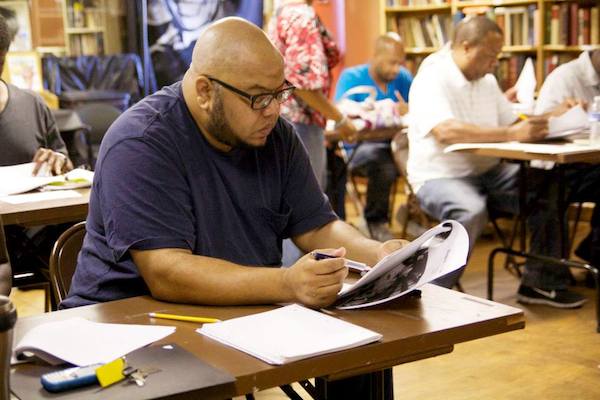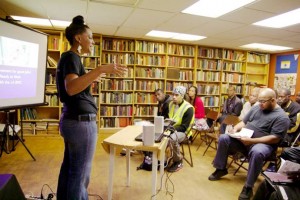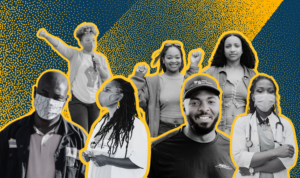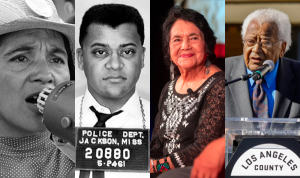Ready to Work Places Black Workers in Jobs
Vincent Loque has over ten years of experience building, repairing, and hard wiring computers. Yet when he went to look for work, one place in the application always stopped him in his tracks– the checkbox about his criminal record. Employers often called him in for an interview and seemed to like him, but once the conversation turned to the felony on his record, they would suddenly lose interest.
“I could see their faces change. They would see my application and their interest would go out the window,” Loque explained. Loque’s story is not uncommon in South Los Angeles, where policing is high, quality jobs have disappeared, and so many people have a friend or family member in prison. Finding work after coming out of prison is a major challenge. Many employers repeatedly reject qualified workers without providing opportunities for them to tell their stories or prove their work ethic. Local groups have recently tried to respond to this issue by promoting policies such as a “Ban the Box” initiative and this year’s Proposition 47.
Turned away so many times, Loque decided to return to school to complete the electrical construction and maintenance program at La Trade Tech and hopefully find work in the construction industry. There, he was connected to PV Jobs, where LA Black Worker Center (BWC) organizer Sherri Bell invited him to a BWC event. After attending, he stayed connected to the center, volunteering and sharing his struggles of finding work. The BWC encouraged him to attend Ready to Work, its social justice job readiness program.
Ready to Work is one of the many programs at the LA Black Worker Center. The BWC was established in 2011 in South Los Angeles, the first of its kind in the United States. Its mission is to develop organized power and authentic grassroots leadership among Black workers with the aim to reverse the disproportionate levels of unemployment in Los Angeles Black communities.The Ready to Work program is a rigorous readiness program that addresses gaps in diversity compliance by assessing, preparing, and referring Black workers.
“We frequently hear from contractors that they are unable to find Black workers for their projects despite the fact that Black workers are well represented in many apprenticeship programs,” says Lanita Morris, BWC program manager. “We decided to launch the Ready to Work program so that there would be a clear pipeline for qualified Black workers to quality jobs.”
Through the Ready to Work program, BWC partners with agencies and employers so they can directly recruit qualified workers from the center. Workers then undergo a multi-day day training to sharpen job readiness skills, learn about the industry, understand qualifications, and become leaders in the workplace. This training includes workshops such as resume writing, mock interviewing, and knowing your rights on the job. Workers learn how to answer questions about their professional experience or criminal record. Math tutoring is also available. In addition to readiness training, the Ready to Work Program stresses the need for workers to think and act collectively when it comes to accessing work and retention.
“Traditional workforce development focuses on the individual, but one person getting a job will not solve the Black job crisis,” said Lola Smallwood Cuevas, director of the LA BWC. She said Ready to Work participants also volunteer to support the center’s campaigns to win policies and practices that create equity in the labor market and end inferior jobs in the Black community. “It’s a space to balance the needs of individual workers but to build worker networks for collective change in the labor market overall.”
Perhaps one of the most striking aspects of the program is that it brings together so many different types of people, who share their struggles of finding work and celebrate each other’s successes.
“The most memorable part of the program was the different walks of life we all came from,” said Loque. “We all were not from the same neighborhood but from the same environment. It was interesting how we all came together and we were able to help each other.”
The program has also led Black Worker Center members to find employment. For Vincent, being a part of the Ready to Work program found him a full time job with Kinkisharyo in the city of Palmdale. The Japanese based firm won a contested bid to manufacture railcars for the Los Angeles Metropolitan Transit Authority (MTA) –working on everything from floor panels, to insulation, electrical wiring, and chair placement. Vincent is currently working as a wire technician. Nearly 90 percent of BWC’s Ready to Work graudates referred to Kinkysharyo were offered positions.
“If you have an open mind about someone who has a background and you give them a chance because you truly feel like they have done their time, they take full responsibility for their actions and are straightforward, they are worth hiring,” said Loque.
For more information visit, http://lablackworkercenter.org/.




